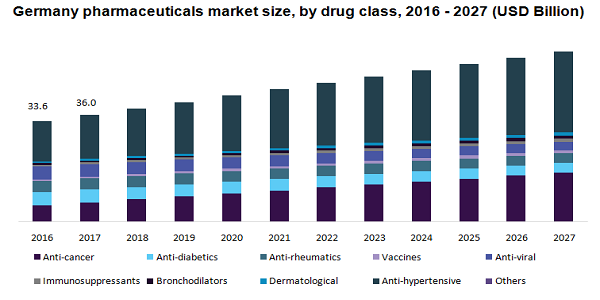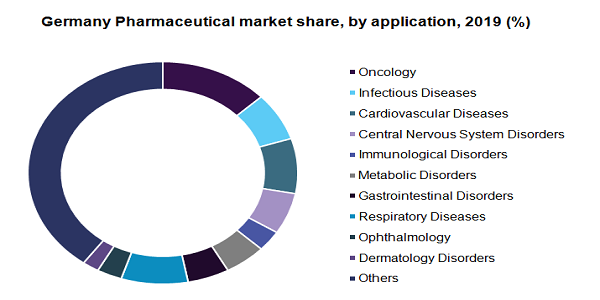- US: +1-408-610-2300
- Toll Free: +1-866-831-4085
- Become a Client
The German pharmaceuticals market size was worth USD 41.4 billion in 2019. The market is projected to register a 6.0% CAGR over the forecast duration, 2020 to 2027. The growing number of patents to develop novel drugs is likely to supplement the market growth. As per the European Patent Office (EPO) Patent Index 2019, there has been an increase in the patent by 4.40% in 2018 in the pharmaceutical industry. Further, a rise in the export of pharmaceutical products from Germany to other countries is expected to drive market growth. For example, pharmaceutical exports accounted for USD 98.6 billion from Germany as reported by the German Pharmaceutical Industry Association (BPI).

The export of pharmaceuticals has increased by over 10.0% in 2018 as compared to last year. Countries such as the United States, Switzerland, and the Netherlands are the top three importers of a pharmaceutical from Germany. Factors such as supportive reimbursement policies and pricing are anticipated to propel the demand for German pharmaceuticals. Nearly 90.0% of the German population is covered by Statutory Health Insurance (SHI), while the other 10.0% are covered by private insurance and special insurance.
The increasing number of drugs in Phase III clinical trials is projected to become ready for commercial purposes shortly, as a result, the market is estimated to witness significant growth over the next few years. For example, the research and development of Boehringer Ingelheim International GmbH consist of Nintedanib and Empagliflozin. These drugs meant to treat cardiovascular diseases are in the third phase of clinical trials.
Depending on the drug class, the anti-cancer category held over 15.0% share by revenue in 2019. The growing prevalence of cancer and the advent of novel therapies in cancer treatment are driving the segment growth. For example, 71,888 new breast cancer cases, 66,749 new lung cancer cases, and 62,641 new prostate cancer cases were reported as per GLOBOCAN 2018.
Major players in the industry are focusing on the development of new drugs to treat cancer. For example, Nubeqa (darolutamide) obtained marketing authorization in 2020, from the European Commission. The compound, which is an oral Androgen Receptor inhibitor (ARi), has been developed by Bayer in partnership with Orion Corporation and is expected to help treat a certain type of prostate cancer.
Based on type, the branded drug category held the highest share in the market in 2019. Factors such as the growing adoption of new therapies, strategic collaboration, and rise in the research and development activities are attributing to the segment growth.
However, the advent of biosimilars has made considerable changes in the treatment of cancer in Germany. The increasing availability of economical drugs and patent exclusivities expiration are driving the demand for generic drugs and biosimilars in the market. Thus, the generic drug segment is anticipated to witness the highest growth in the market. Major players are focusing on acquiring generic drugs to consolidate their position in the market. For example, STADA AG, in early 2020, acquired GlaxoSmithKline plc’s brands like Cetebe vitamin C supplements, Coldrex cold remedy, Mebucaine sore throat range, and Venoruton, Tavegyl allergy brand.
Based on formulation, the solid type formulation category is estimated to register considerable growth owing to cost-effectiveness and various other benefits. Further, local market players are focusing on licensing and collaboration to expand their business presence. This factor is also anticipated to bode well for the growth of the German pharmaceutical industry.
For example, Bausch Health Companies Inc. & Bausch + Lomb, in 2019, acquired a license to develop and commercialize Novaliq GmbH’s NOV03. NOV03 helps in treating DED associated with Meibomian gland dysfunction (MGD).
By application, oncology held the largest share of over 15.0% by revenue in 2019. The increasing number of partnerships and collaborations to consolidate the product portfolio is driving the segment growth. For example, Lupin Ltd and Boehringer Ingelheim International GmbH collaborated in 2019 to develop, license, and commercialize Lupin’s MEK inhibitor compound (LNP3794) meant to treat cancer.

In addition, companies are increasingly developing novel drugs to increase prescription drugs availability, which, in turn, is projected to drive market growth. For example, Clovis Oncology, Inc. developed Rubraca in 2019. This prescription drug is estimated to be used for ovarian cancer.
Germany's pharmaceutical market has been positively affected owing to the outbreak of COVID-19. The pandemic has led to rising in the number of patient counts in Germany, which, in turn, resulted in the rise in the demand for the development of new drugs. Various German players are developing vaccines for coronavirus, which is further projected to drive market growth. For example, German company BioNTech, in collaboration with US-based Pfizer has started the human trial for the COVID-19 vaccine. In addition, the government of Germany has granted permission to other two German biotech firms namely - Biologika and CureVac to develop the COVID-19 vaccine.
Major players operating in the market are focusing on the development of vaccines for diseases caused by infections. The development of new vaccines would help market players in capturing a larger market share in Germany. For example, Dohme Corporation and Merck Sharp, in 2019, obtained the approval for the ERVEBO vaccine from the European Union Commission. This vaccine is meant for the Zaire Ebola virus for people aged above 18 years. Key players operating in the market are Bayer AG, Pfizer Inc.¸ Abbvie Inc., Novartis AG, STADA Arzneimittel AG, and Abbott among others.
|
Report Attribute |
Details |
|
The market size value in 2020 |
USD 44.2 billion |
|
The revenue forecast in 2027 |
USD 65.9 billion |
|
Growth Rate |
CAGR of 6.0% from 2020 to 2027 |
|
The base year for estimation |
2019 |
|
Historical data |
2016 - 2018 |
|
Forecast period |
2020 - 2027 |
|
Quantitative units |
Revenue in USD million and CAGR from 2020 to 2027 |
|
Report coverage |
Revenue forecast, company ranking, competitive landscape, growth factors, and trends |
|
Segments covered |
Drug class, application, type, formulation |
|
Country scope |
Germany |
|
Key companies profiled |
Boehringer Ingelheim International GmbH; Bayer AG; Merck & Co., Inc.; Fresenius Kabi AG; STADA Arzneimittel AG; Pfizer Inc.; Abbott; Abbvie Inc.; Teva Pharmaceutical Industries Ltd.; Novartis AG; Sanofi; Johnson and Johnson Services, Inc.; GlaxoSmithKline plc; AstraZeneca; Celgene Corporation; Amgen Inc.; Novo Nordisk A/S; Eli Lilly and Company; Allergan |
|
Customization scope |
Free report customization (equivalent up to 8 analyst’s working days) with purchase. Addition or alteration to country, regional & segment scope. |
|
Pricing and purchase options |
Avail of customized purchase options to meet your exact research needs. |
This report forecasts revenue growth at global, regional, and country levels, and provides an analysis of the latest industry trends in each of the sub-segments from 2016 to 2027. For this study, Million Insights has segmented the German pharmaceuticals market based on drug class, application, type, and formulation:
• Drug Class Outlook (Revenue, USD Million, 2016 - 2027)
• Anti-cancer
• Anti-diabetics
• Anti-rheumatics
• Vaccines
• Anti-viral
• Immunosuppressant
• Bronchodilators
• Dermatological
• Anti-hypertensive
• Others
• Application Outlook (Revenue, USD Million, 2016 - 2027)
• Oncology
• Breast cancer
• Lung cancer
• Colorectal cancer
• Ovarian cancer
• Prostate cancer
• Others
• Infectious Diseases
• Cardiovascular Diseases
• Central Nervous System Disorders
• Immunological Disorders
• Metabolic Disorders
• Gastrointestinal Disorders
• Respiratory Diseases
• Ophthalmology
• Dermatology Disorders
• Others
• Type Outlook (Revenue, USD Million, 2016 - 2027)
• Branded
• Generics
• Formulation Outlook (Revenue, USD Million, 2016 - 2027)
• Solid formulation
• Tablets
• Capsules
• Others
• Liquid & semi-liquid formulation
• Oral
• Topical
• Sublingual and buccal
• Rectal
• Parenteral


Research Support Specialist, USA